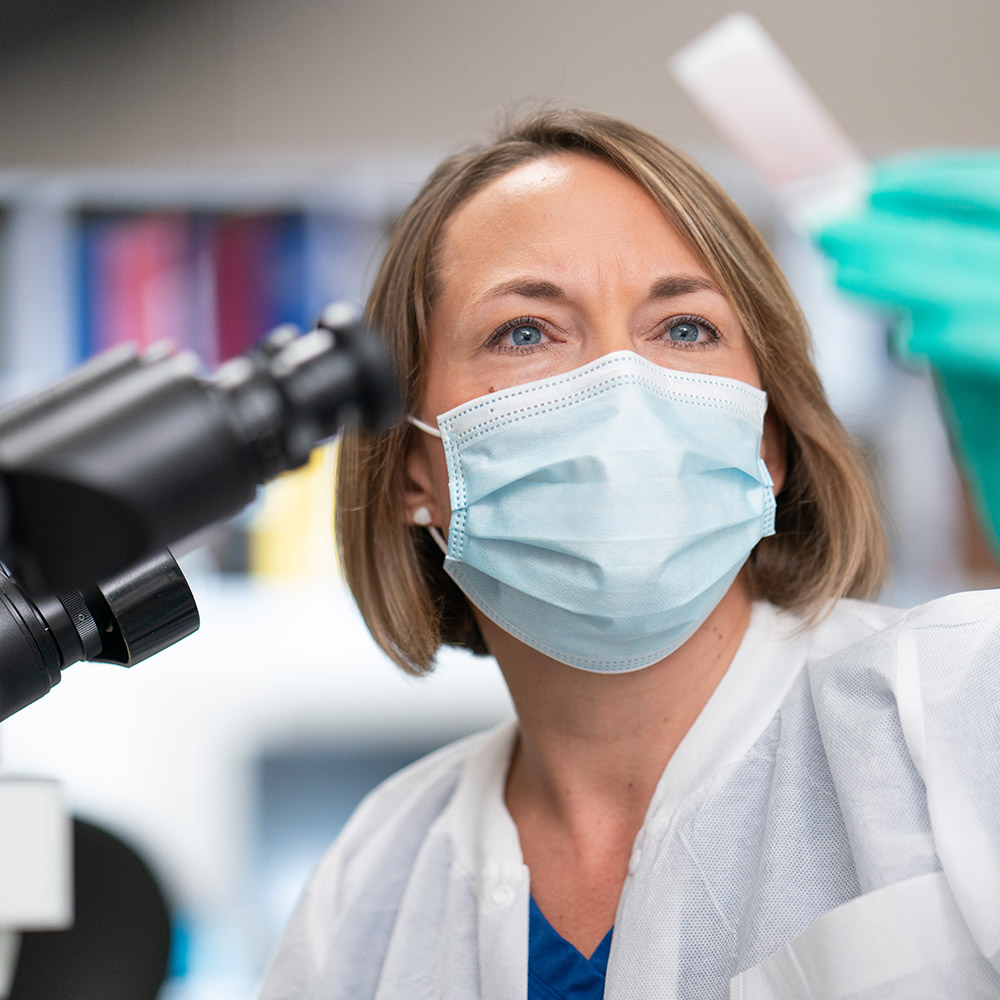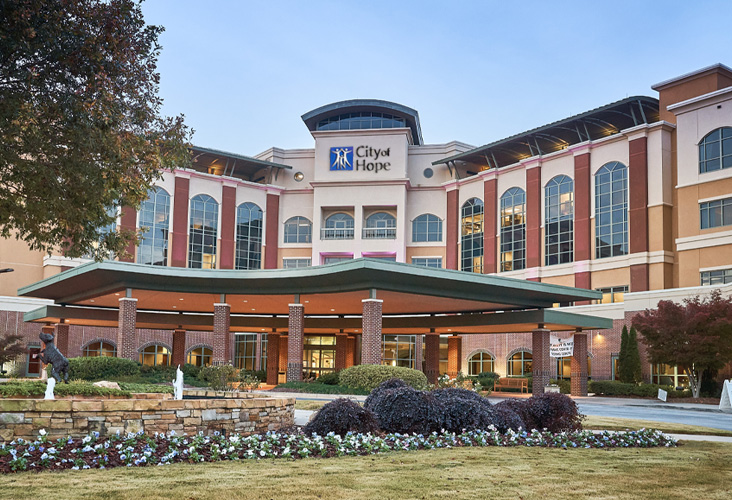


At City of Hope® Atlanta, named "high performing" in colon cancer surgery by U.S. News & World Report's 2024-25 rankings, our GI Cancer Center clinicians are committed to offering state-of-the-art treatments for patients with gastrointestinal cancer. Our multidisciplinary team of board-certified medical oncologists, surgical oncologists, radiation oncologists and supportive care clinicians work with our patients to deliver quality clinical care with a patient-centered approach. After your diagnosis, your GI Cancer Center care team will discuss your options with you and help you develop a personalized care plan tailored to your individual needs.
Our doctors are trained and experienced in treating the wide range of gastrointestinal diseases, including colorectal, bile duct, liver, anal, pancreatic, gastroesophageal cancers, and neuroendocrine tumors. Treatments for most gastrointestinal diseases include chemotherapy, radiation, surgery, targeted therapy or immunotherapy, either alone or in combination.
At the GI Cancer Center, our surgical oncologists have expertise in standard-of-care and advanced treatment procedures, including a surgical technique called irreversible electroporation, which is used to treat certain pancreatic cancers that can't be removed with surgery. Irreversible electroporation is designed to use electric pulses to destroy cancer cells without damaging healthy tissue. For patients with advanced colorectal, appendix or stomach cancer, surgery to reduce the size of a tumor may be recommended in combination with hyperthermic intraperitoneal chemotherapy (HIPEC), a highly concentrated, heated chemotherapy treatment delivered directly to the abdominal cavity during surgery.
For patients with early-stage esophageal cancer or non-cancerous polyps in the intestines, our gastroenterologists combine state-of-the-art technologies with non-surgical techniques, such as endoscopic mucosal resection, to remove abnormal tissue. They also use a wide range of tools, such as endoscopic ultrasound with fine needle biopsy and radiofrequency ablation, to treat esophageal, pancreatic, bile duct and colorectal cancers.
Learn more about our neuroendocrine tumor expert care
 Kevin E. Woods, M.D., M.P.H.
Chief, Interventional Endoscopy, Gastroenterology & Nutrition, City of Hope Atlanta
Kevin E. Woods, M.D., M.P.H.
Chief, Interventional Endoscopy, Gastroenterology & Nutrition, City of Hope Atlanta
 Shahin Chowdhury, D.O.
Medical Oncologist, City of Hope Atlanta
Shahin Chowdhury, D.O.
Medical Oncologist, City of Hope Atlanta
 Lily Shakibnia, M.D., M.S.c., D.A.B.R., F.R.C.P.C.
Chief of Radiation Oncology, City of Hope Atlanta
Lily Shakibnia, M.D., M.S.c., D.A.B.R., F.R.C.P.C.
Chief of Radiation Oncology, City of Hope Atlanta
 Delia Radovich, M.D.
Medical Oncologist
Delia Radovich, M.D.
Medical Oncologist
The GI Cancer Center at City of Hope® Cancer Center Atlanta is committed to a multidisciplinary approach to care. After diagnosis, each patient is evaluated by a gastroenterologist, a surgical oncologist, a medical oncologist and a team of supportive care clinicians, who consult with one another on the range of cancer treatment options and side-effect management tools available. Then, the doctors and clinicians work with the patient as a team, to develop a treatment plan designed to achieve pre-established goals.
This collaborative, personalized approach allows us flexibility along the treatment journey, while also fostering an environment where experts in a variety of disciplines work together, all under one roof. New options may arise or different goals may be proposed during the course of treatment. We monitor the patient throughout treatment and adjust the care plan as needed.
Because of the digestive tract’s role in processing food and waste, many patients with gastrointestinal disease have difficulty with digestive function. That’s why nutrition therapy is a key component of the GI Cancer Center’s approach. The center has a dedicated clinical dietitian on staff to work with patients in developing a healthy, balanced and appetizing nutrition plan. If patients become malnourished, our dietitian is also available to help them establish healthy lifestyle and eating habits to help improve their condition.
The GI Cancer Center team also works closely with other supportive care clinicians to manage additional disease- and treatment-related side effects, such as nausea and vomiting. These supportive care experts may include a pain management physician, naturopathic provider, behavioral health therapist and spiritual support provider.
The gastroenterologists with the GI Cancer Program at City of Hope Atlanta, are armed with an advanced diagnostic tool called GI Genius™, which uses artificial intelligence (AI) technology to help doctors more clearly and quickly identify colon polyps, adenomas and cancerous or pre-cancerous lesions.
In assisting the physician conducting the examination, GI Genius highlights areas of the colon that may look suspicious, including spots doctors may have missed, prompting them to take a closer look. A clinical trial that compared colonoscopy results with and without the device found that using GI Genius “significantly increases” the detection rate of adenomas during a colonoscopy.
GI Genius was the first AI device approved by the U.S. Food and Drug Administration for use during a colonoscopy, and our hospital was the first in the western United States to use it.
Our oncologists are committed to improving treatment options for gastrointestinal cancer patients. As part of that commitment, the GI Cancer Center offers qualified patients carefully selected clinical trials in studying new treatment approaches like immunotherapy for pancreatic cancer and other innovative research.
Although clinical trials are not available to all patients, they may offer some patients options that would otherwise be unavailable to them. Your care team will discuss whether you qualify for any of our ongoing clinical trials, and if so, help you enroll.
Learn more about the City of Hope clinical trials program and which trials are available

Offering clinical trials on new and emerging cancer treatment options.
View our clinical trials